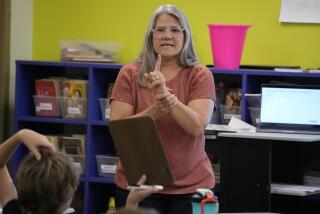Teaching Mathematics
- Share via
As a teacher for almost 25 years, I am outraged by the implication of your Nov. 27 editorial, “Multiplying Math Woes,” that supporters of what you call “nontraditional math programs” do not value or expect students to learn math facts, specifically multiplication facts. Quite the opposite is true. What many of us have recognized for years is that many of our students cannot memorize these facts by using traditional “flashcard” methods in isolation and that only when these students see patterns and connections to the meaning of multiplication do they gain the power of learning mathematics. The passage to “doing multiplication problems” then is easier and makes sense.
It does no good to continue this absurd math war. Your editorial continues to fan the flames.
LARRY TENDIS
Huntington Beach
*
As an elementary school LAUSD teacher, your reference to the Mathland mathematics program really got my attention. Approximately five years after adoption, most LAUSD teachers have been through countless hours of redundant training associated with the implementation of Mathland. The school district has undoubtedly spent millions of dollars on it. Nevertheless, most teachers and many schools have rejected it as an ineffective program for teaching math. There are stacks of Mathland kits in thousands of classrooms that are seldom used, and when they are used it is to supplement programs that individual teachers, and in some cases entire schools, are using without the LAUSD sanction.
The paperwork requirements for this program continue to drain the time and energy of teachers and administrators. The required assessments are still administered, the reports are still compiled and the critical, finite resources of money, time and teachers’ energy continue to be wasted.
BILL FOULK
Arcadia
*
Problem-solving skills, the centerpiece of modern mathematics education, have their roots in the number sense that comes from the study of traditional arithmetic. Calculators and computers have taken the drudgery out of math, but they cannot replace the number sense that is learned in the process of mastering many of the fundamental concepts, facts and skills of basic arithmetic.
It is no secret that America’s schoolchildren are not performing well in math. The major reason for this is that most students do not have early exposure to arithmetical thinking and, as a result, they are not aware of how numbers work. Without this understanding, meaningful problem-solving skills rarely develop. Please keep up your editorial pressure in favor of retaining basic skills in the modern mathematics curriculum.
LARRY MARTINEK
Culver City






